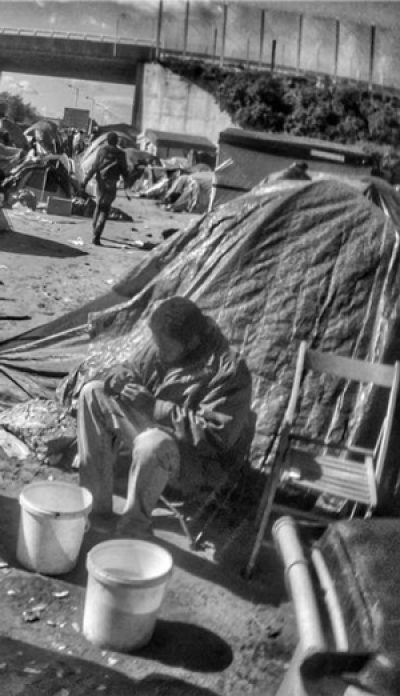Disabled, Homeless, Unwanted… (Ros' Blog)

Just over a year ago I wrote a blog post about the terrible plight of disabled Iraqi Christians, many of whom were internally displaced refugees. Now we have a vast number of people on the move, fleeing unimaginable horrors in places like Eritrea, Chad, Sudan, Iraq and Syria, not to mention a significant number in Latin America.
The United Nations High Commission for Refugees (UNHCR) estimates that of the 51 million refugees in the world today, 7.7 million are disabled. A study by the Women’s Refugee Commission found that disabled refugees encounter societal, environmental and communication barriers that make it difficult for them to access humanitarian aid.
One of the biggest problems faced by disabled refugees of all ages is social exclusion, stigmatisation and even violence. People who are innately vulnerable find their vulnerability heightened by their displacement from home. Since very few of the mainstream disability organisations work specifically with refugees, there is very little support for them.
In the Old Testament God gave instructions about people who migrated to join the community of the Children of Israel: “Do not mistreat or oppress a foreigner, for you were foreigners in Egypt.” (Exodus 10. 21). “You are to treat the resident alien the same way you treat the native born among you—love him like yourself, since you were foreigners in the land of Egypt.” (Leviticus 19. 34). “And you are to love those who are foreigners, for you yourselves were foreigners in Egypt.” (Deuteronomy 10.19). It’s hardly surprising if Jesus has a special place in His heart for refugees, since He spent His early life on earth as a refugee in Egypt fleeing a government that sought to kill Him.
There appears to be only one scheme specifically targeting disabled asylum seekers – a project for teaching British Sign Language and providing life coaching to deaf refugees. International conventions provide for disabled asylum seekers whose applications are being processed to be granted benefits which are normally only paid to people who have met certain contribution conditions, and that they must receive the protection afforded by conventions on disability discrimination. The Trust Fund for Handicapped Refugees was set up with money from the Nobel Peace Prize. In any case, UNHCR has always seen resettlement of disabled people as a last resort, preferring to prioritise their integration into their own communities.
But in the present crisis, none of this is of much help to a disabled refugee. Remaining in their own communities means certain death in many of the current areas of conflict, especially in regions where a stigma is attached to disability, and disabled people’s lives are not valued. Most Western countries are doing all they can to keep refugees out, and the countries bordering the conflict zones are so swamped with the sheer numbers of destitute people in need of help that distinguishing which ones are disabled and making extra provision is currently out of the question.
No one knows exactly how many disabled people there are among the refugees and internally displaced persons trying to make their way to a place of safety at present, but with 11 million of Syria’s 20 million population having had to flee their homes, and 4 million of them having managed to leave Syria, the numbers are clearly going to be considerable and UNHCR’s estimate may be a conservative one.
So what can we do in the face of such an overwhelming need? Once again, as I wrote just over a year ago, a key part of our role in the world as representatives of God’s kingdom is to pray that His Kingdom will come and His will be done throughout the world. We can pray that God will move hard hearts and that a spirit of compassion will arise for the millions of homeless people wandering the globe in search of safety. Those of us who are able can write and urge governments to give sanctuary to those who need it. All over the country, groups of people are collecting, storing and sorting aid to be shipped out to refugees. Wherever you live in the UK, there will be such a group near you because they are spreading like wildfire. And, in the face of need on such a huge scale, let’s remind ourselves that God is still sovereign, none of this has taken Him by surprise, and He is still the God who hears and answers the cry of the needy and oppressed.
Photograph courtesy of Viv Dawes, follow this link to her website.
All of Us Complete in Christ

Through the Roof asked disabled people from across the UK four questions about church. This easy-to-read research document contains their answers, plus a whole range of suggestions and good ideas to help your church become the most welcoming and inclusive place it can be.
Follow this link for the PDF of All of Us Complete in Christ (2MB download)
Do you want ongoing support with making your church a more welcoming and inclusive place, or do you have stories you'd like to share with others? We can support you to become a 'Roofbreaker' in your church follow this link to find out more.
We'd love to hear your comments and feedback about the findings, please Facebook, Tweet, e-mail or phone us...
- Follow this link for our Facebook page
- Follow this link for our Twitter page
- Follow this link to email the office or ring us on 01372 749955
The Assisted Dying Bill

The Assisted Dying Bill is to be debated in the House of Commons on Friday 11th September. Through the Roof has issued a full briefing on this matter (follow this link to read that briefing, but we also recommend that people read the statement issued by the Church of England’s national adviser on medical ethics: follow this link to read the statement. Any relaxation of the prohibition on ending life prematurely would make disabled people in this country feel very vulnerable, especially as they are already subject to pressure to refuse resuscitation in circumstances where other people would not (follow this link to change.org for more information on that). Fiona Bruce MP states that most MPs are undecided on this and will be swayed by their constituents’ views. Through the Roof would therefore encourage you to write to your MP (find their contact details by following this link to www.writetothem.com) and urge them to vote against this piece of legislation.
Extract from briefing on Rob Marris MP’s Assisted Dying Bill
- What does the bill propose?
- The bill would allow someone who has a terminal illness and is expected to die in the next six months to request a physician-assisted suicide provided that they have a voluntary, clear, settled and informed wish to end their own life, and have been offered all palliative care alternatives. It does not allow a doctor to end a patient’s life, but allows the doctor to give the patient whatever drugs and assistive devices they might need in order to end their own life.
- What has happened in other countries which have a law like this?
- In Holland, Belgium, Switzerland and Oregon where a physician-assisted death is permitted, some common patterns have emerged:
- There is no real way to ensure that someone is not being coerced into taking this decision e.g. by relatives who stand to benefit from the person’s will.
- Very tightly defined laws have gradually expanded to include many cases originally outside the remit of the law. This has happened not by amendments being made to the law, but by stretching the definitions of terms included in the law – e.g. “unbearable pain” has been extended to include depression and “terminal illness” to include psychiatric conditions previously considered treatable.
- A massive year-on-year increase in the numbers of assisted deaths has ensued.
- There have been disputed cases where it is believed someone was killed against their own or their family’s wishes.
- The practice has gone beyond voluntary assisted death to involuntary euthanasia.
- There is not one single example of a country where this law has been enacted and these effects have not been observed.
- Are there any other worrying factors?
- There has been a blurring of ethical lines, so that organisations drafting and promoting the legislation are distributing the lethal drugs, and stand to profit financially as well as ideologically from an increase in assisted deaths.
- There is evidence of doctors failing to report assisted deaths to the proper authorities, so that the reported assisted deaths do not accurately reflect the actual numbers.
- A breakdown of trust has occurred between doctors and patients so that in Holland 10,000 people now carry anti-euthanasia passports for fear of being killed by doctors in the event of an illness or accident.
- In this country, Baroness Warnock has been advocating for a duty to die, that people should not have the right to be a burden to their relatives or the NHS. This is morally very different from a right to die.
- Already in the UK, healthy young people with a normal life expectancy are routinely and repeatedly invited to have “Do Not Resuscitate” written on their medical notes simply because they have a disability – something no one would ask their non-disabled peers. (see This Change.org site for more details)
- Does assisted suicide always work?
- According to a BBC report, attempts at assisted suicide fail to lead to an easy death in almost one in five cases. There is evidence from Holland and Oregon of supposedly fatal doses leading to nothing other than gasping, vomiting and comas from which the patient later recovered.
- In 18% of cases doctors felt the need to intervene. In countries where active euthanasia is permitted, this intervention takes the form of the doctor administering a lethal injection. The Marris bill does not provide for active euthanasia so we can expect to see cases like the one in Oregon where, after a man took the prescribed dose of lethal drugs, physical symptoms were so disturbing that his wife called 911. He was taken from his home to a hospital where he was revived.
- Why shouldn’t people have the right to an assisted death?
- It is usually the “worried well” who favour assisted suicide – all the major disability organisations in this country oppose it because of the danger it would pose to vulnerable disabled people.
- There is abundant evidence that such laws lead to mistakes and abuses which can never be put right.
- Financially hard-pressed NHS trusts will be tempted to offer assisted death instead of costly treatment.
- As a society we have always been clear that suicide is not something to be encouraged. This law would change that, and in so doing would change something fundamental in the foundations of our society.
- What is a Christian response?
- The Bible has always been clear that humans are made in the image of God, and to take a human life is a grave sin.
- These truths are also enshrined in the Catechism of the Catholic Church.
- Jean Vanier points out that our value comes not from the quality of our life or our ability to be productive but from being loved by God.
- This law would damage both the protection for vulnerable individuals and the nature of our society.
- It is part of being human that we show compassion to people at the cost of some personal sacrifice, rather than viewing them as a burden.
- The only guaranteed safeguard to disabled people’s right to life is not to have an assisted dying law.
- 7. What can I do?
- Contact your MP (www.writetothem.com) Most of them have not yet decided how to vote. Your email might sway your MP.
- Join a protest outside the Houses of Parliament during Friday’s debate (follow this link for more details.)
- Pray. There is a battle for the heart of our country and we should be employing our spiritual weapon of prayer in the fight against evil.
Yes.
The full text of this briefing can be found by following this link and downloading the full text in a word document

